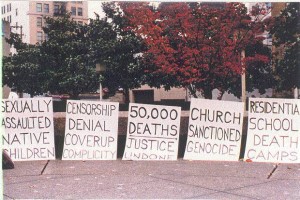Without truth, there is no reconciliation
Recently, I was invited to the home of a lovely Hudson couple to pick up a book that they had for me – journalist Carol Off’s The Lion, The Fox and The Eagle. It deals with the conflicts of the former Yugoslavia, a subject of great interest to me.
While there, I brought up the Truth and Reconciliation Commission and the series of talks held in Montreal this past April to discuss the plight of aboriginal children sent to residential schools, and the immense loss created for the families and communities left behind.
I wanted to attend this event but didn’t because I was too busy. Since then, I’ve come to a realization: issues relating to the First Nations communities are very Canadian in nature. They should be of interest to all of us. Instead, it’s a subject that gets pushed to second, or even last place, in all of our lives.
I remember stories of hardship and suffering posted in the media: A young boy taken away from his family and community and made to endure not only the worst and most humiliating forms of abuse, but also robbed of any sense of identity (he was no longer addressed by his given name and was instead assigned a number). Or a grandmother recalling the day when she stepped out her front door and could no longer hear the sound of children playing outdoors, because they had all been taken away.
We Canadians have a vague knowledge of this history. We know that these things happened as a result of official Canadian government policy. But this doesn’t go far enough. It’s important to hear the stories of those who have been wronged and made to suffer, so that we can understand where they’re coming from.
It’s easy to fall into the trap of blaming aboriginals for their problems. It’s a classic “blame the victim” game. And ultimately, the only thing that this accomplishes is to re-victimize the victims. Nothing good can come from this.
Why are Canada’s First Nations communities perpetually facing poverty and substance abuse issues? Countless different responses can be given to this question. But without a doubt, there’s a link between current problems faced by Aboriginals and the history of residential schools and other injustices perpetrated against this group.
Is it really that hard to understand why it’s so difficult for aboriginals to become successful? We’ve all heard of the old adage “nothing succeeds like success.” If you come from a well-off family of professionals, it’s almost impossible not to succeed. Everything is handed to you on a silver platter. But what about the Native child, growing up in poverty, oppression, marginalization, with a lack of proper nutrition, in a family and community where dysfunction and substance abuse are the order of the day? How likely is it that this individual will grow up to be “successful”?
Because of my work on the Bosnian War and Genocide and my membership with the Institute for Research of Genocide Canada (IGC), I’ve come across an interesting fact: according to the UN Convention on Genocide dating back to 1948, forcibly transferring children from one group to another group is considered to be an act of genocide – an act committed with the intent to destroy, in whole or in part, a national, ethnical, racial or religious group.
The word “genocide” didn’t exist back in the days when Canada’s Indian Act was implemented, in 1876. It came about during and after World War II, in the aftermath of the Holocaust. But it’s reasonable to assume that this Act was implemented for one reason: To obliterate the First Nations communities that existed in this land long before the white, European male set foot on this territory.
I’m a first-generation Canadian. My parents fled Communist Yugoslavia and came here in hope of having a better future. Many others have done likewise in previous generations. People the world over continue to come here in search of a better life. We all know that for better or worse, Canada is one of the best places in the world to live. Except, of course, if you happen to be Native. And it’s also occurred to me that those who are most closely connected to their aboriginal roots are less likely to ever get a piece of that proverbial pie.
Are we, as Canadians, truly capable of reconciling ourselves with this fact?
by Suzana Vukic
Suzana Vukic is Columnist in the Hudson/St.Lazare Gazette and a Member of the International Expert Team and the Governing Board of the Institute for Research of Genocide, Canada
http://www.gazettevaudreuilsoulanges.com/2013/09/11/without-truth-there-is-no-reconciliation/
Since 1890, the Roman Catholic, Anglican, Presbyterian and United Church of Canada have perpetrated murder, land theft, mass sterilizations, medical experiments, and sexual terrorism on native people across Canada. Government documents and eyewitnesses confirm that over 50,000 children died in the “residential schools” run by these churches until 1984, or more than 50% of the inmates of these facilities.
And yet not a single church official has been tried for these crimes. On the contrary, Canadian taxpayers continue to subsidize these very churches which committed all five of the definitions of Genocide established by the United Nations’ 1948 Convention on Genocide, which Canada ratified in 1952.
These same churches are also in violation of the domestic Canadian laws governing charitable bodies, which state that any charity (like a church) must spend ALL of its revenue on charitable activities; not on lawyers, public relations experts and corporate investments, as these churches have done.
Churches are not above the law; and neither should we be paying their bills to help them avoid the consequences of their criminal actions.
Hidden from History
The Canadian Holocaust
The Untold Story of the Genocide of Aboriginal Peoples by Church and State in Canada
by (Rev.) Kevin Annett
http://canadiangenocide.nativeweb.org/index.html

